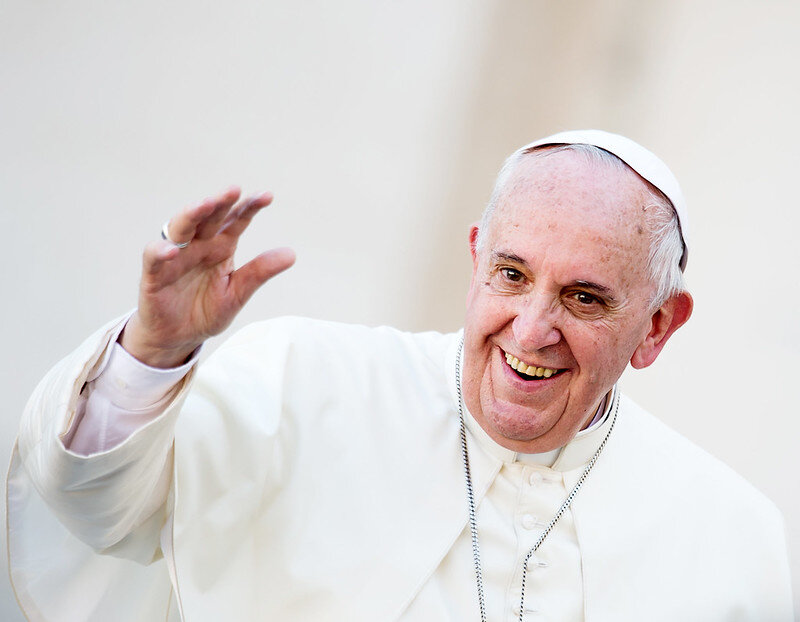October 4, 2020
Feast of Saint Francis of Assisi
My dear confreres, lay colleagues, and all who experience the ministry of the Oblates of Saint Francis de Sales around the world, my brothers and sisters:
On October 1, in a handwritten note to the Superiors General of religious institutes of men and women, Pope Francis wrote: “I am happy to be able to share with you the new encyclical letter “Fratelli tutti”. Its title is the exhortation of Saint Francis to follow the message of Jesus: to recognise each other as brothers and sisters and to live accordingly in the common home that the Father entrusted to us.” For the first time, the Holy Father has requested that each Superior General, in addition to the Bishops, join him in presenting the Encyclical and making it available to all the members of the Congregation, all our collaborators and associates, and all our brothers and sisters within our sphere of influence. As Italians would say, a tutti! I am honored to have been invited into the process of facilitating the reception of the Encyclical. I am equally honored, for the first time, to be able to address all of you in our Oblate world.
We Oblates, and those who work with us today, are under the influence of three men by the name of Francis—Pope Francis, Francis of Assisi, and Francis de Sales. While Pope Francis took the name of Francis of Assisi, we recognize much of our Francis in him as well. In 1616, Saint Francis de Sales published the classic, Treatise on the Love of God. It has often been remarked that he wished to compose a parallel treatise on the love of neighbor. In Fratelli Tutti, an encyclical letter “On Fraternity and Social Friendship,” Pope Francis fulfills this desire. He writes: “The following pages do not claim to offer a complete teaching on fraternal love, but rather to consider its universal scope, its openness to every man and woman. I offer this social Encyclical as a modest contribution to continued reflection, in the hope that in the face of present-day attempts to eliminate or ignore others, we may prove capable of responding with a new vision of fraternity and social friendship that will not remain at the level of words. Although I have written it from the Christian convictions that inspire and sustain me, I have sought to make this reflection an invitation to dialogue among all people of good will” (§6).
All who are familiar with Salesian spirituality will take note that the Holy Father grounds his Encyclical in what we call the virtues of Salesian hospitality and Salesian solidarity. In fact, the theme of our twentieth General Chapter (Annecy, France) in 2018 was “Fraternal Humanism: Cultivating Salesian Solidarity Among Ourselves and Within our World.” At that General Chapter we reflected on our experience of violence in society and against creation, interculturality and migration, and contemporary issues concerning youth.
Fraternal Humanism has as its goal the building of a civilization of love. Salesian Solidarity in the context of Fraternal Humanism more firmly links the thinking and actions of one Francis, our patron saint, with another Francis, our pope, across time and space.
How we cultivate Salesian Solidarity among ourselves and within our world today gets to the heart of being an Oblate. This is our essential spirituality and identity expressed in mission. Blessed Louis Brisson, our founder, insisted that we “are thus called to enter society such as it is” and to make it Christian, “by every means possible” (Chapter, 1 February 1893).
Pope Francis views hospitality as one specific way of opening ourselves, moving beyond ourselves, and encountering others. This is the foundation of social friendship, with the greatest possible danger lying in failing to love (§92). We need a universal and existential openness to expand our circle of friends, even out toward the margins of society, the result of a “conscious and careful cultivation of fraternity” (§104).
To achieve this ideal, Pope Francis calls us to solidarity, to thinking and acting in terms of community. His description of solidarity includes giving the lives of all priority over the acquisition of goods by a few, combatting the structural causes of poverty and inequality, and attending to the lack of work, land, and housing. It is more than clear that this Encyclical on fraternity and social friendship, this reflection on the love of neighbor, is by no means ethereal. It is contextualized in ever widening socio-political-financial-ecclesial-ecumenical circles and spheres of influence.
Launching from a survey of the dark clouds that currently hang over a closed world and a sustained theological reflection on the parable of the Good Samaritan, Pope Francis then envisions an open world and hearts that are open to the whole world. He calls for a better kind of politics in our societies, critiquing both populism and liberalism alike, and for a new culture, arising out of social dialogue grounded in acknowledging the other and the recovery of kindness, consensus, and truth. He encourages the world to take the path of renewed encounter in truth to deal with conflict, practice forgiveness, eschew war and the death penalty, and construct peace. He asks world religions to place themselves at the service of fraternity in our world, recognizing that religious violence only distorts our religious convictions.
I encourage all of you in your reading, reflection, and discussion of this Encyclical. It is, I believe, a hard-hitting global examination of conscience that is more than likely to provoke both inspiration and nods of approval, on the one hand, as well as pointed questions and profoundly defensive reactions, on the other. Like any good examination of conscience, it calls for the ruthless honesty of a believer before God and in relation to the neighbor—but in this instance, all neighbors, all our brothers and sisters, without exception. In his Admonitions, Saint Francis of Assisi addressed his brothers and sisters as fratelli tutti and encouraged them with counsels on how to live a Gospel-infused way of life in the world of their day and with all. Quoting the saint, Pope Francis remarks: “Of the counsels Francis offered, I would like to select the one in which he calls for a love that transcends the barriers of geography and distance, and declares blessed all those who love their brother ‘as much when he is far away from him as when he is with him’”(§1).
I conclude with A Prayer to the Creator which Pope Francis places at the end of his Encyclical:
Lord, Father of our human family, you created all human beings equal in dignity: pour forth into our hearts a fraternal spirit and inspire in us a dream of renewed encounter, dialogue, justice and peace. Move us to create healthier societies and a more dignified world, a world without hunger, poverty, violence and war.
May our hearts be open to all the peoples and nations of the earth. May we recognize the goodness and beauty that you have sown in each of us, and thus forge bonds of unity, common projects, and shared dreams. Amen.
My brothers and sisters, please be assured of my prayers for all of you. In this time of global pandemic—how strange it is that we are all united in this one reminder of our need to protect each other—may God keep you safe and grant you health to serve those entrusted to your care.
Live Jesus!
Most Rev. Barry R. Strong, OSFS
Superior General
Fratelli Tutti: http://www.vatican.va/content/francesco/en/encyclicals/documents/papa-francesco_20201003_enciclica-fratelli-tutti.html
DeSales Weekly: https://www.oblates.org/desales-weekly
DeSales Weekly Editor: Fr. John (Jack) Kolodziej, OSFS

























